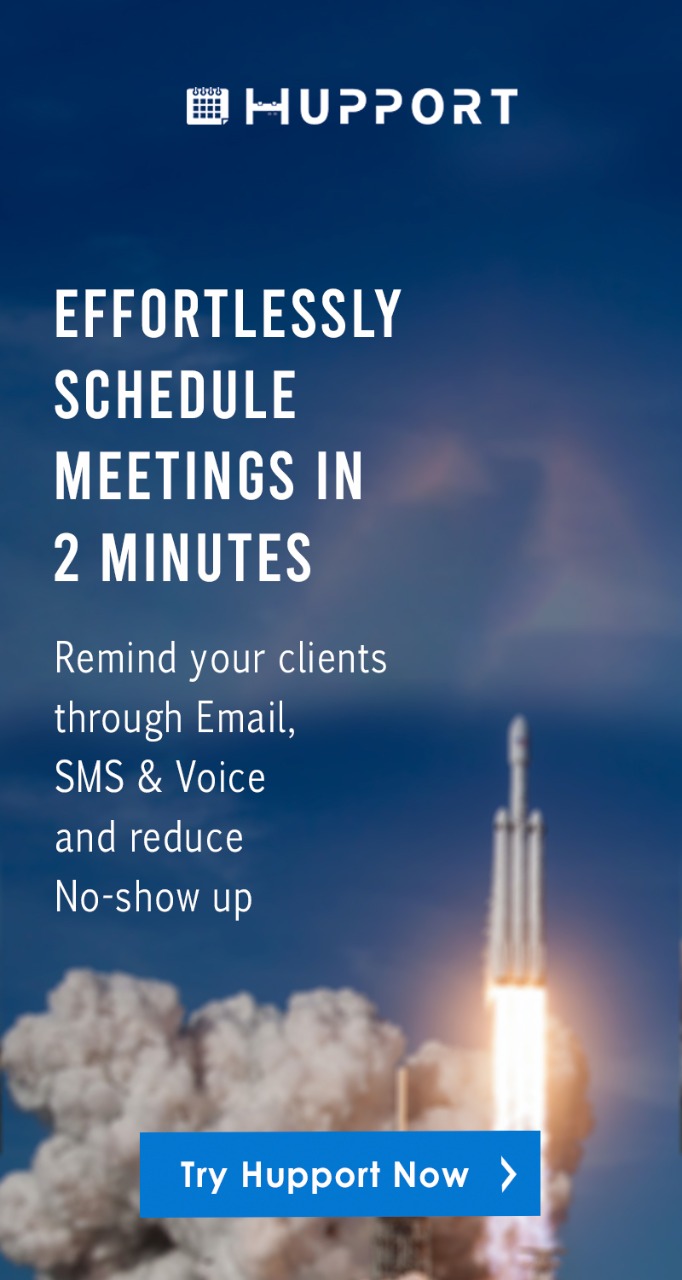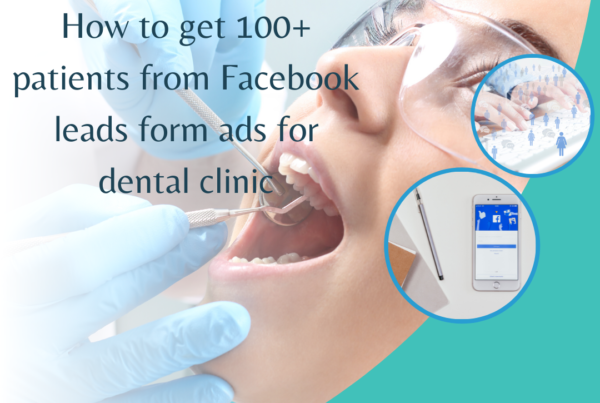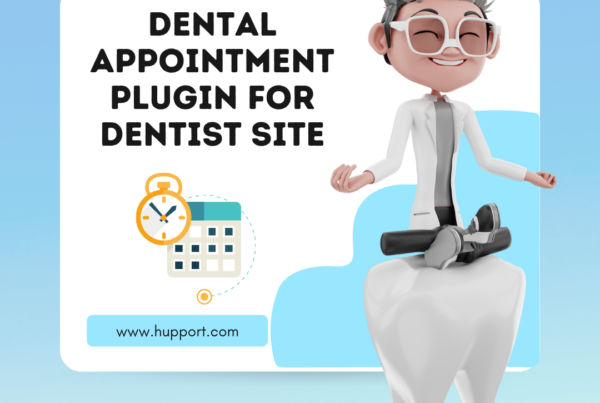Dental PPC Guide
Dental PPC Guide : Google AdWords vs Facebook Ads : When you know the demographics of your target market, you will be able to target your advertising at the people most likely to become your customers.
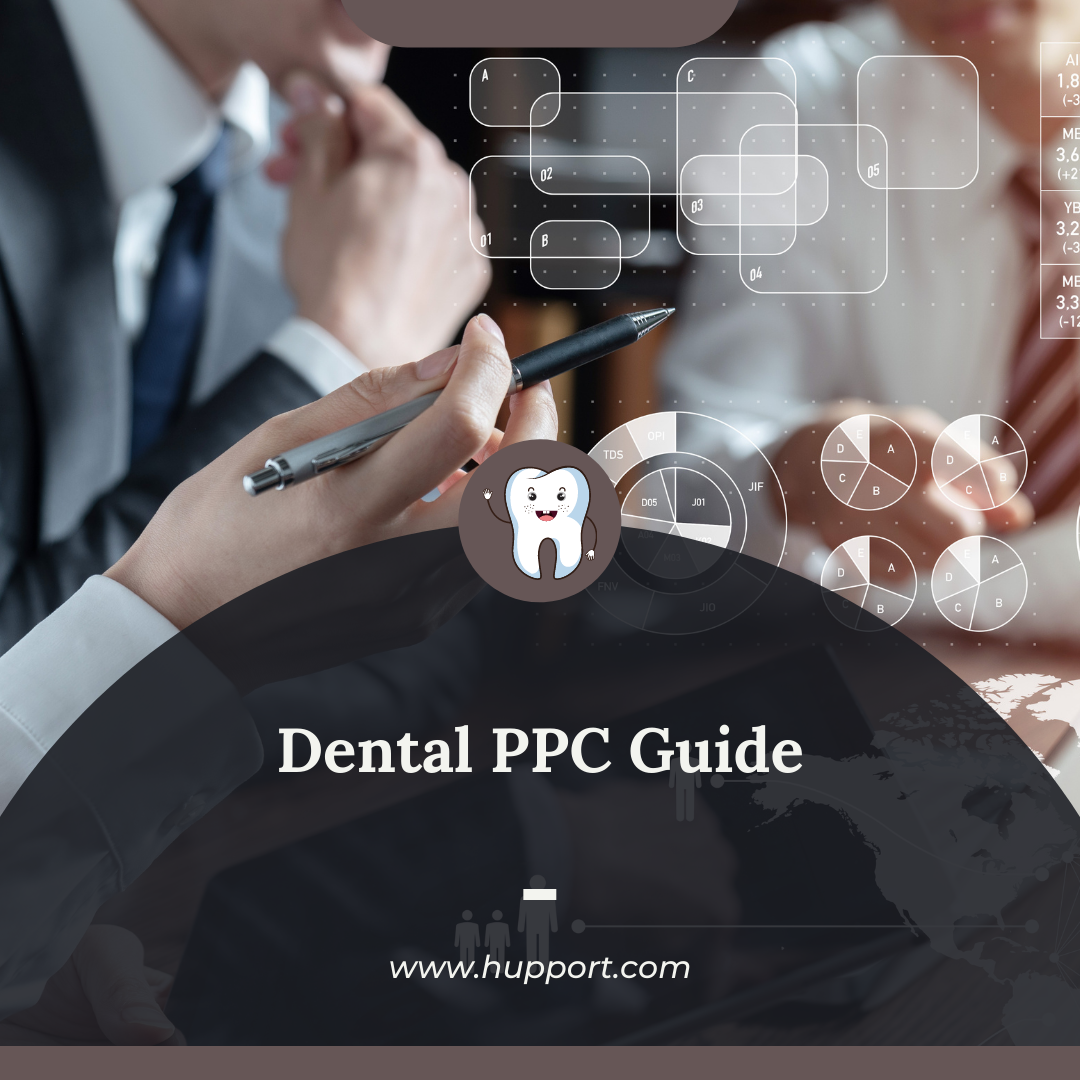
Dental PPC Guide
Most of the traditional dental advertising channels don’t give you much control over who sees your ads. You are not able to target your advertising to the right people. This means that half the people who see your ad might not be interested in seeking a dentist.
Pay-per-click (PPC) advertising puts you in control of who sees your ads. It allows you to decide who sees your ads, how much you want to spend on those ads, and what city or region you want your ads to be shown.
Before we go further, let’s quickly take a look at what PPC really means.
What is Pay-per-Click Advertising?
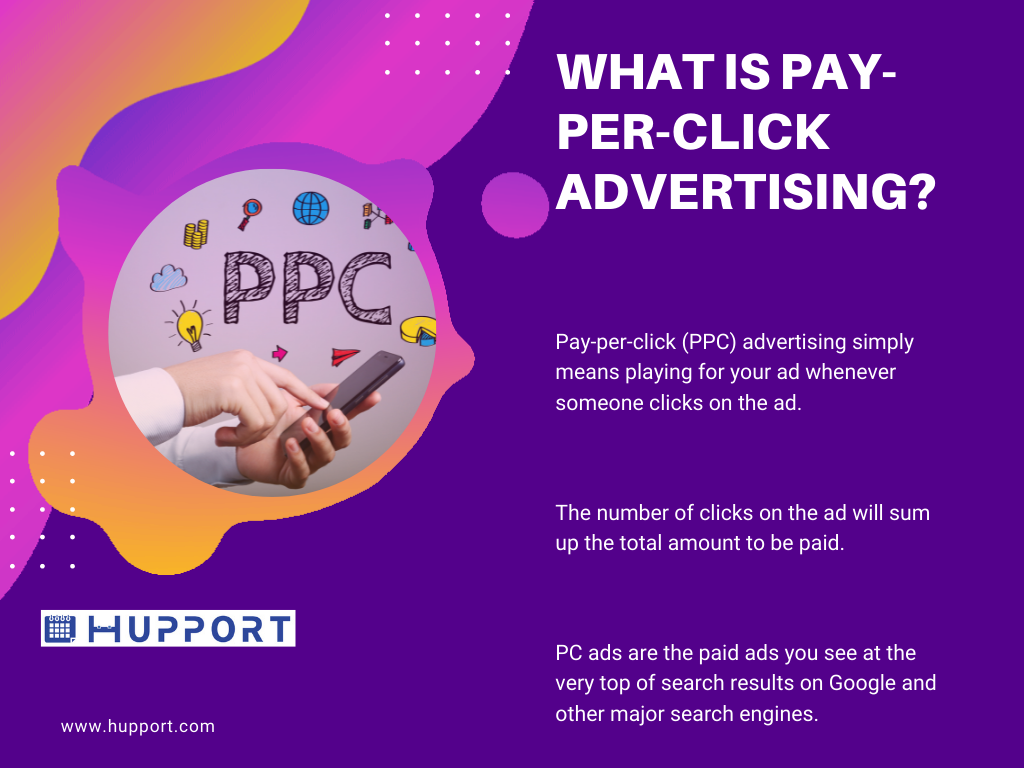
What is Pay-per-Click Advertising?
Pay-per-click (PPC) advertising simply means playing for your ad whenever someone clicks on the ad. The number of clicks on the ad will sum up the total amount to be paid.
PPC ads are the paid ads you see at the very top of search results on Google and other major search engines. PPC ads are also available on many social media sites.
You can create PPC ad campaigns that will show your ad whenever searches are made by individuals for a particular keyword or phrase or based on things they’ve liked or followed on social media.
For example, if you’re a dentist in Dallas, Texas. You could set up a PPC ad campaign that would show your ad whenever someone searches on Google or any other major search engine for “Dallas family dentist”. When someone searches for “Dallas family dentist”, your ad would pop up at the top in the paid search results.
Google AdWords Keywords: How It Works
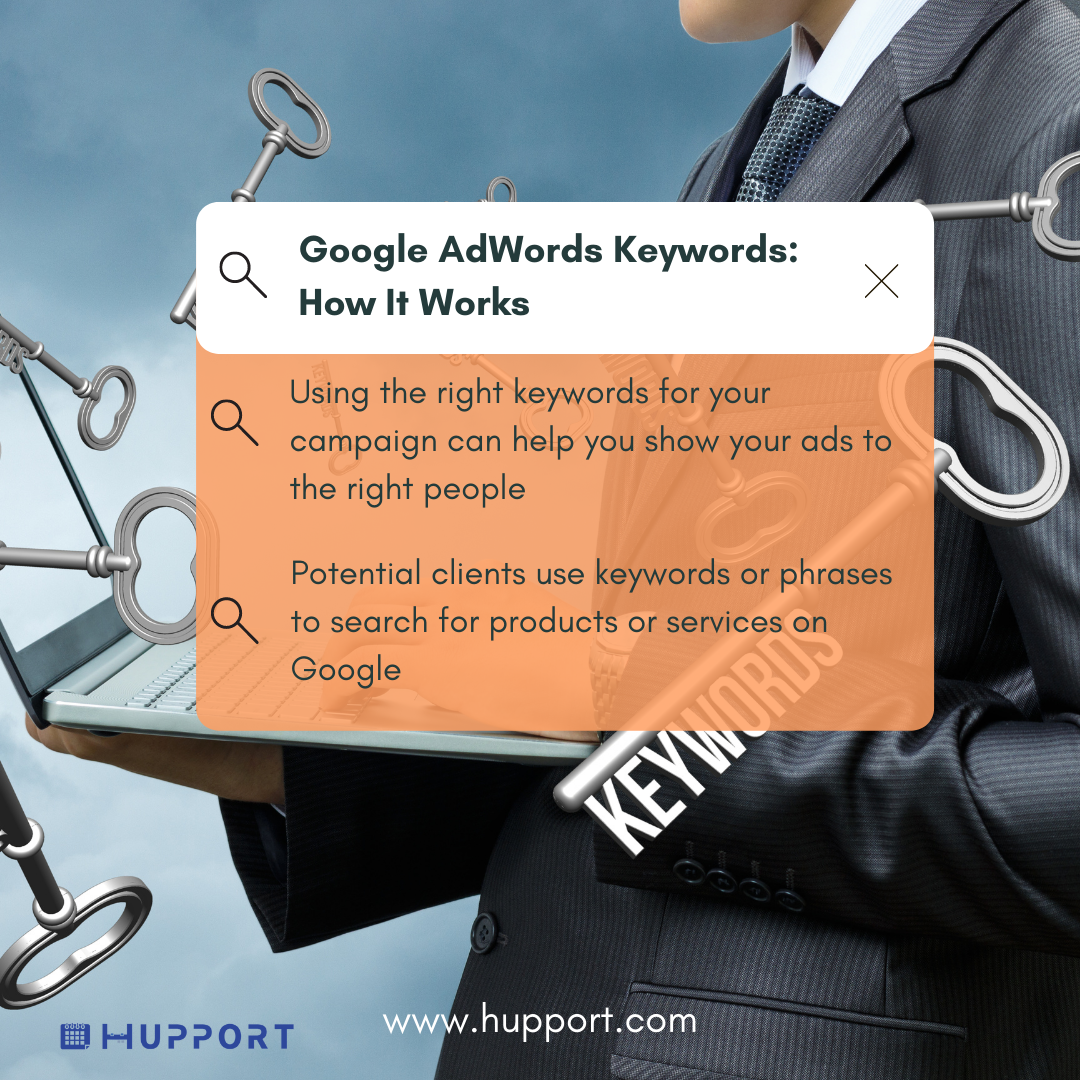
Google AdWords Keywords: How It Works
Using the right keywords for your campaign can help you show your ads to the right people. Potential clients use keywords or phrases to search for products or services on Google. Your keywords should match the terms or phrases that potential clients would use to search and find your products or services.
How Do Google Adwords Keywords Work?
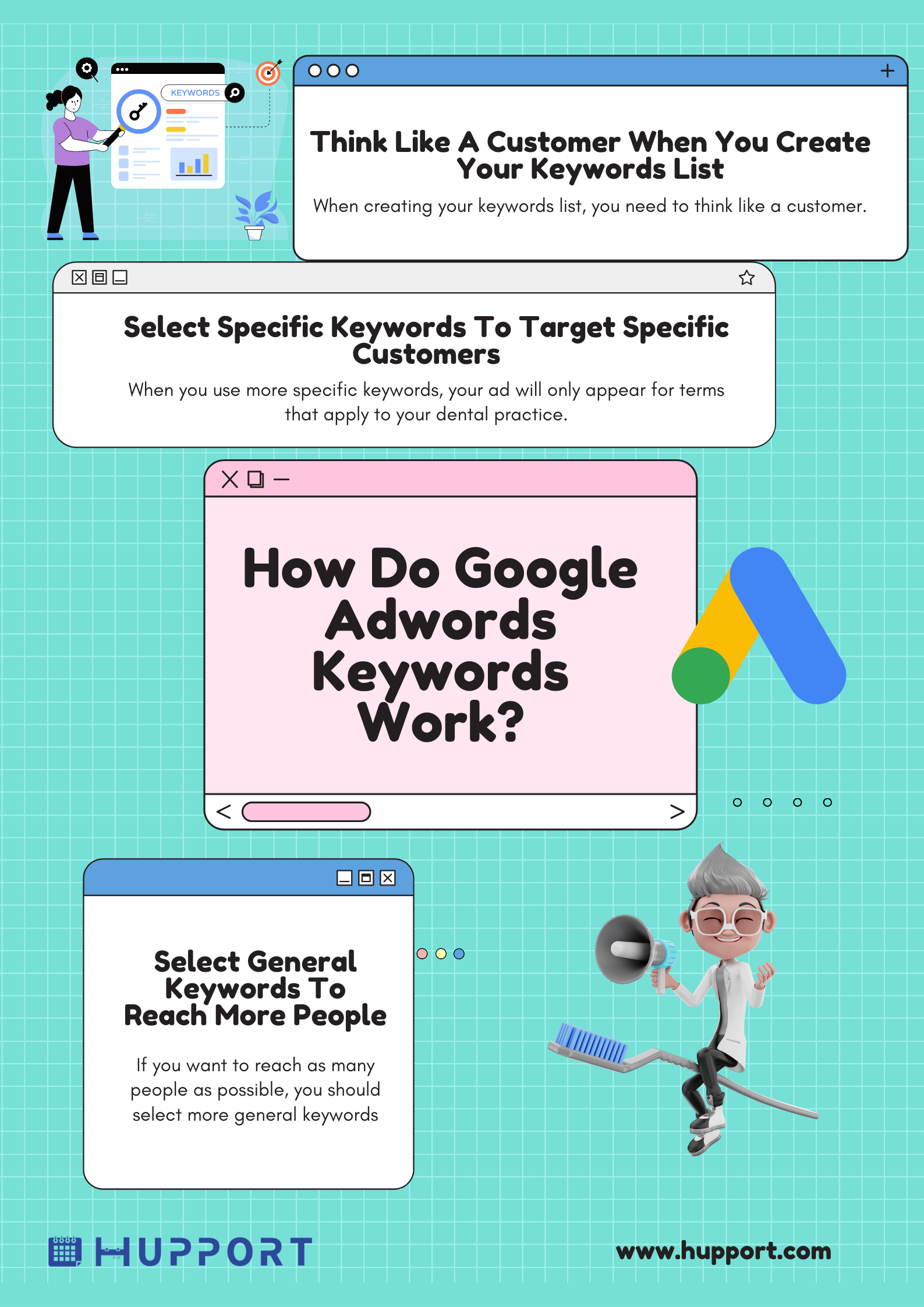
How Do Google Adwords Keywords Work?
In this article, we are going to explain how Google AdWords keywords work and how you can build your keywords list.
Think Like A Customer When You Create Your Keywords List
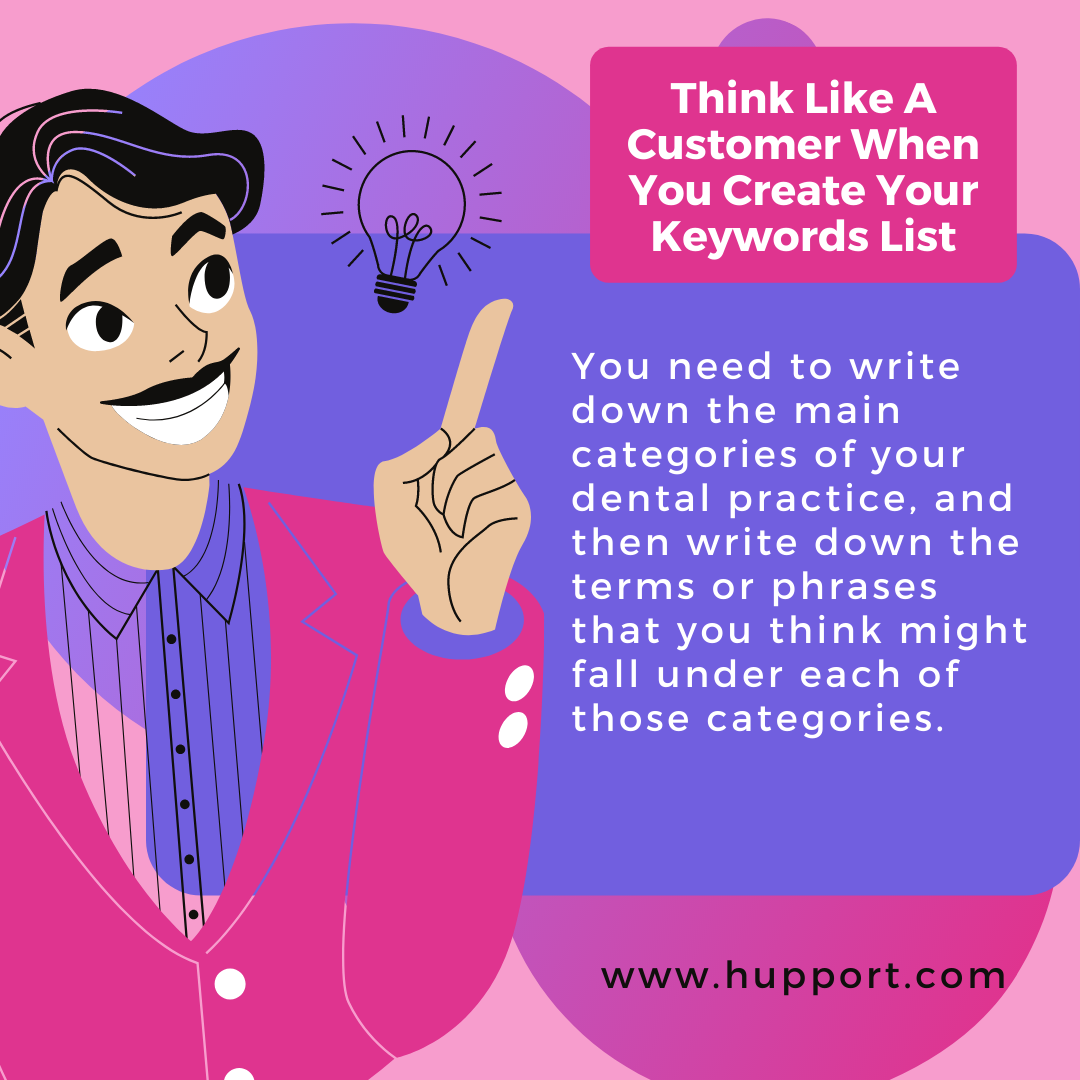
Think like customer
When creating your keywords list, you need to think like a customer. You need to write down the main categories of your dental practice, and then write down the terms or phrases that you think might fall under each of those categories.
Include terms or phrases that you think your clients would use to describe your services. You can perform a Google search of dental practice using different phrases to see what pops out. This will help you know the keywords that people use the most to search for dentists.
Select Specific Keywords To Target Specific Customers
To target specific clients that may be interested in specific dental services and increase your chances of showing at top positions of search results, select more specific keywords that directly relate to your ad’s theme.
When you use more specific keywords, your ad will only appear for terms that apply to your dental practice. You need to bear in mind that if the keywords are too specific, the number of people you might be able to reach will be limited.
Select General Keywords To Reach More People
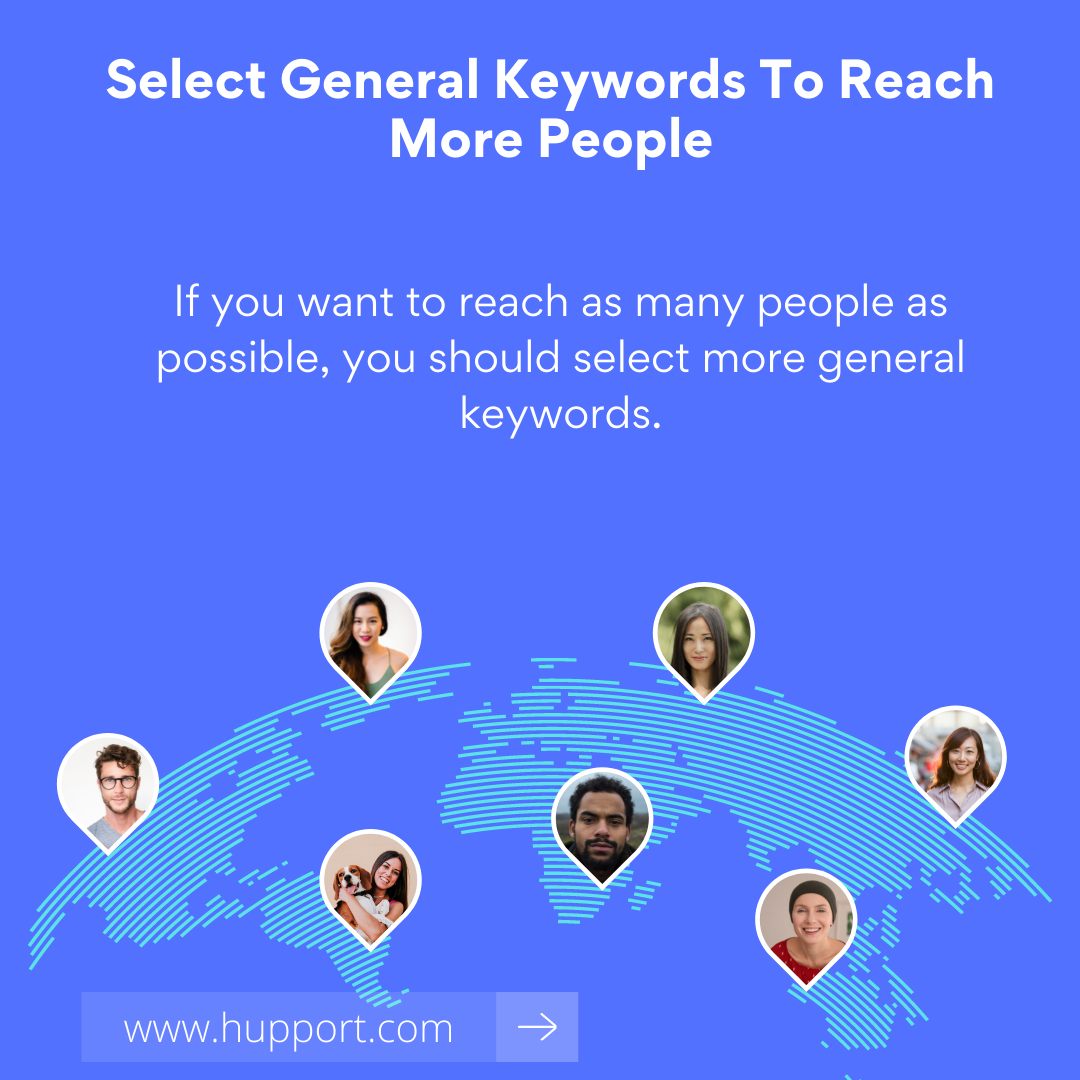
Select General Keywords To Reach More People
If you want to reach as many people as possible, you should select more general keywords. While you will be able to reach more people, you need to keep in mind that you might find it difficult to reach potential clients or your target audience. This is because when you use general keywords, your ad could appear for searches that aren’t always related to your practice. Also, you could pay more for more general keywords because more general keywords can be more competitive and may require higher bid amounts.
Before using general keywords, you need to test them to know which ones give you better results. Even if you must use general keywords, you need to ensure that they’re relevant to your ads and website.
Using the right keywords is the key to a successful PPC ad campaign. If you’re using keywords that are too general or broad, you may end up spending a lot of money on untargeted clicks.
The keywords you use in your PPC ad campaign are used to show your ads to people. Select relevant keywords for your ad campaign so that your ad can be shown to people that are interested in your services and more likely to become your clients.
How To Bid For Target Keywords
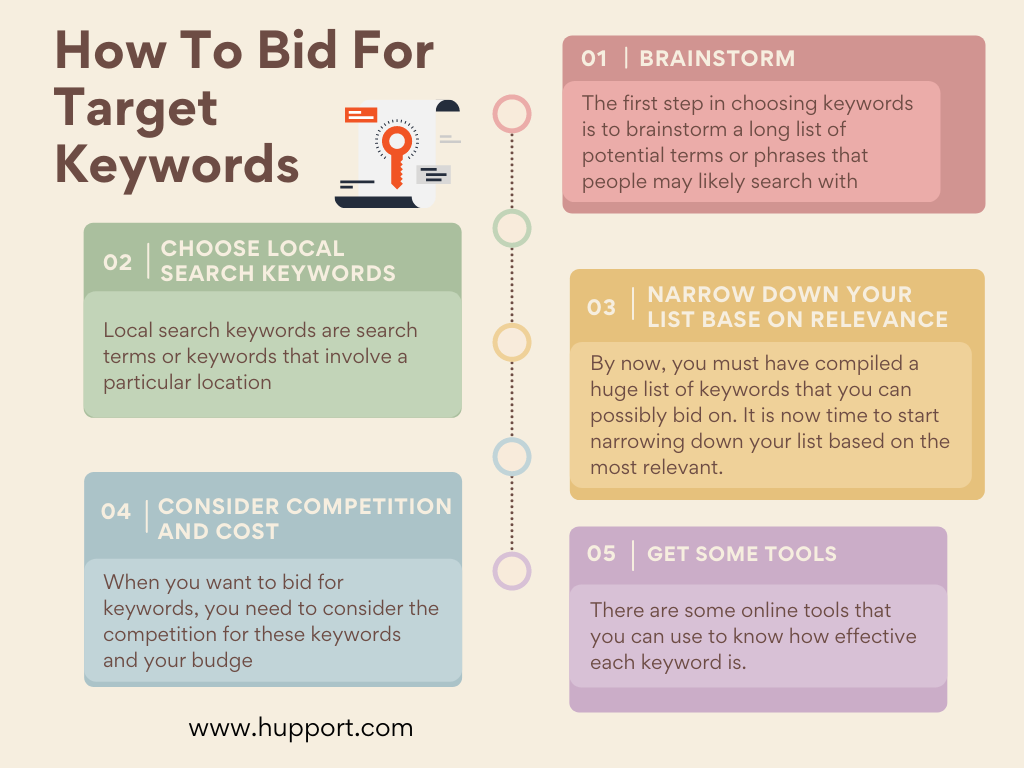
How To Bid For Target Keywords
There’s a lot that goes into selecting the right keywords and bidding for keywords.
The keywords you use in your PPC ad campaign will determine who sees your ad. Choosing keywords wisely ensures that your budget is put to good use.
Before bidding for keywords, there are some important steps you need to take.
Step 1: Brainstorm
The first step in choosing keywords is to brainstorm a long list of potential terms or phrases that people may likely search with. Your list of keywords should be based on the services you offer, location of your office, and the landing pages the ads will link to.
The key here is to get inside your client’s mind and put down their likely thoughts.
Provide answers to questions such as;
What are potential clients searching for?
How do they phrase search queries?
What are they typing into the Google search box when they’re looking for your services?
You should include both head terms and long-tail keyword phrases in your list. Head terms are broader and they likely generate a lot of search volume. Long-tail phrases get your ads to highly targeted audience.
When you’re compiling your list, you should consider all 4 types of keyword terms:
-
Generic terms
These are terms or keywords that describe your service
-
Related terms
These are keywords that don’t directly apply to your services that people may be searching for
-
Brand terms
These are keywords that contain your brand or business name
-
Competitor terms
These are keywords that include the brands and names of your competitors.
After compiling a comprehensive list, you can then move on to the next step.
Step 2: Choose Local Search Keywords
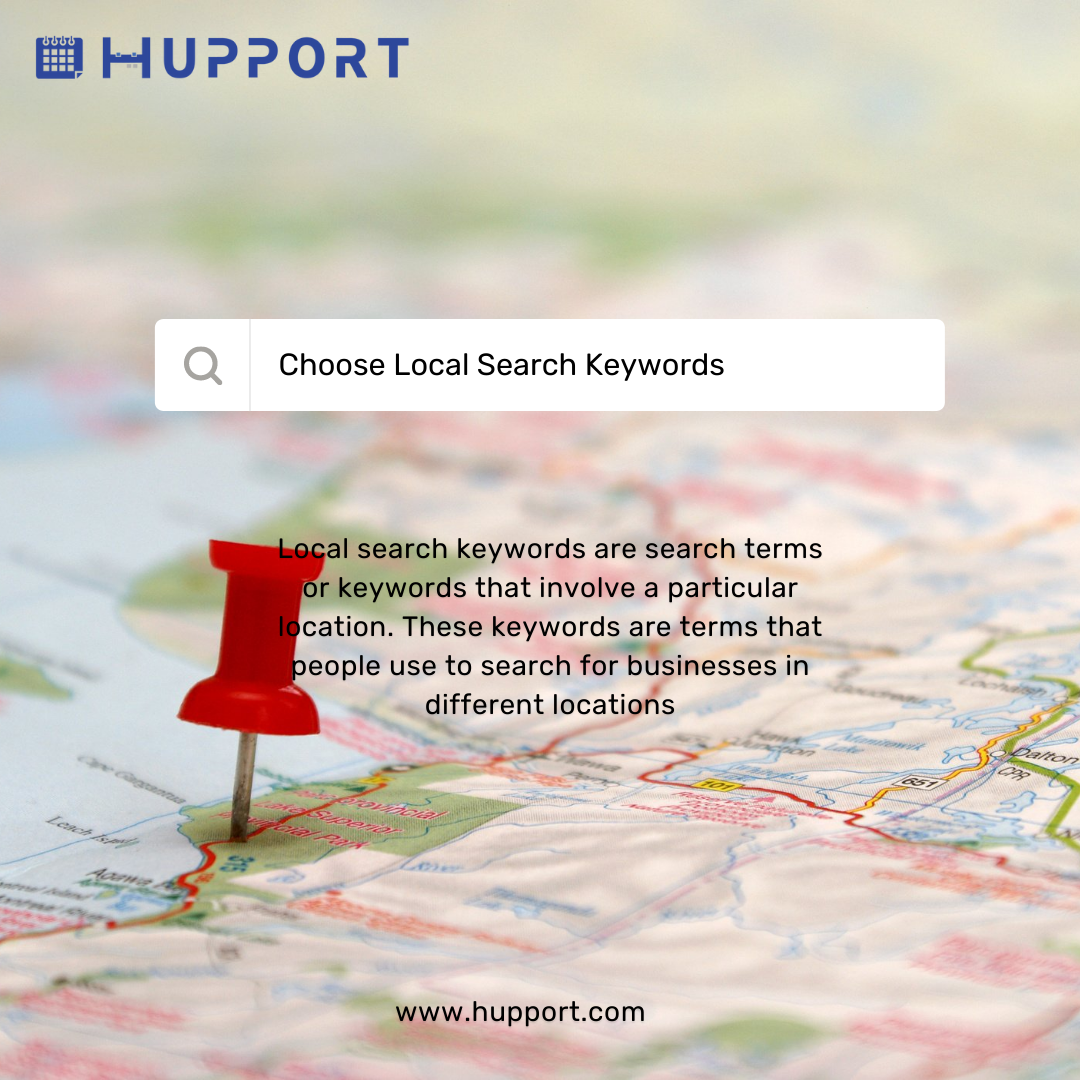
Choose Local Search Keywords
Local search keywords are search terms or keywords that involve a particular location. These keywords are terms that people use to search for businesses in different locations.
Local search keywords are important because potential clients can actually find your business location using these keywords or terms. For example, “dental service in Dallas, Texas”. Local search keywords can also help draw the most relevant audience to your website.
When you’re compiling local search keywords, ensure you include keywords relating to your street address, neighborhood, and town.
Step 3: Narrow Down Your List Base On Relevance
By now, you must have compiled a huge list of keywords that you can possibly bid on. It is now time to start narrowing down your list based on the most relevant.
To determine how relevant a keyword or term is, you need to consider the potential client’s or searcher’s intent.
Are the people who search online for services using this keyword or term actually looking for what you offer? And how likely are they to seek your service?
Another important factor to consider is where the searchers are in the buying cycle. You’ll want to target keywords that indicate a particular time in the buyer’s journey depending on the type of content your ads link to.
After narrowing down your list, you can then move to the next step, which is cost and bidding
Step 4: Consider Competition And Cost
By now, you should have a list of relevant keywords that can drive in potential clients.
When you want to bid for keywords, you need to consider the competition for these keywords and your budget. The competition for a particular keyword will determine the cost of the keyword. The competition for a particular keyword can also negatively affect its performance.
For example, if your clinic is named “Apple dental clinic”, can you realistically expect your ads to show up when people search for “Apple?” You can’t expect your ads to show up when people search for “Apple” because there is another well-known company known as “Apple” which will always show up.
Also, it can get expensive to bid on highly competitive keywords or your competitor’s brand keywords.
Before bidding on keywords, it’s important to do your research to determine who else is bidding on the same keywords. You should know how much they’re spending and the average cost per click for each keyword.
The information you get will help you determine which keywords are worth spending your budget on and which you shouldn’t.
Step 5: Get Some Tools
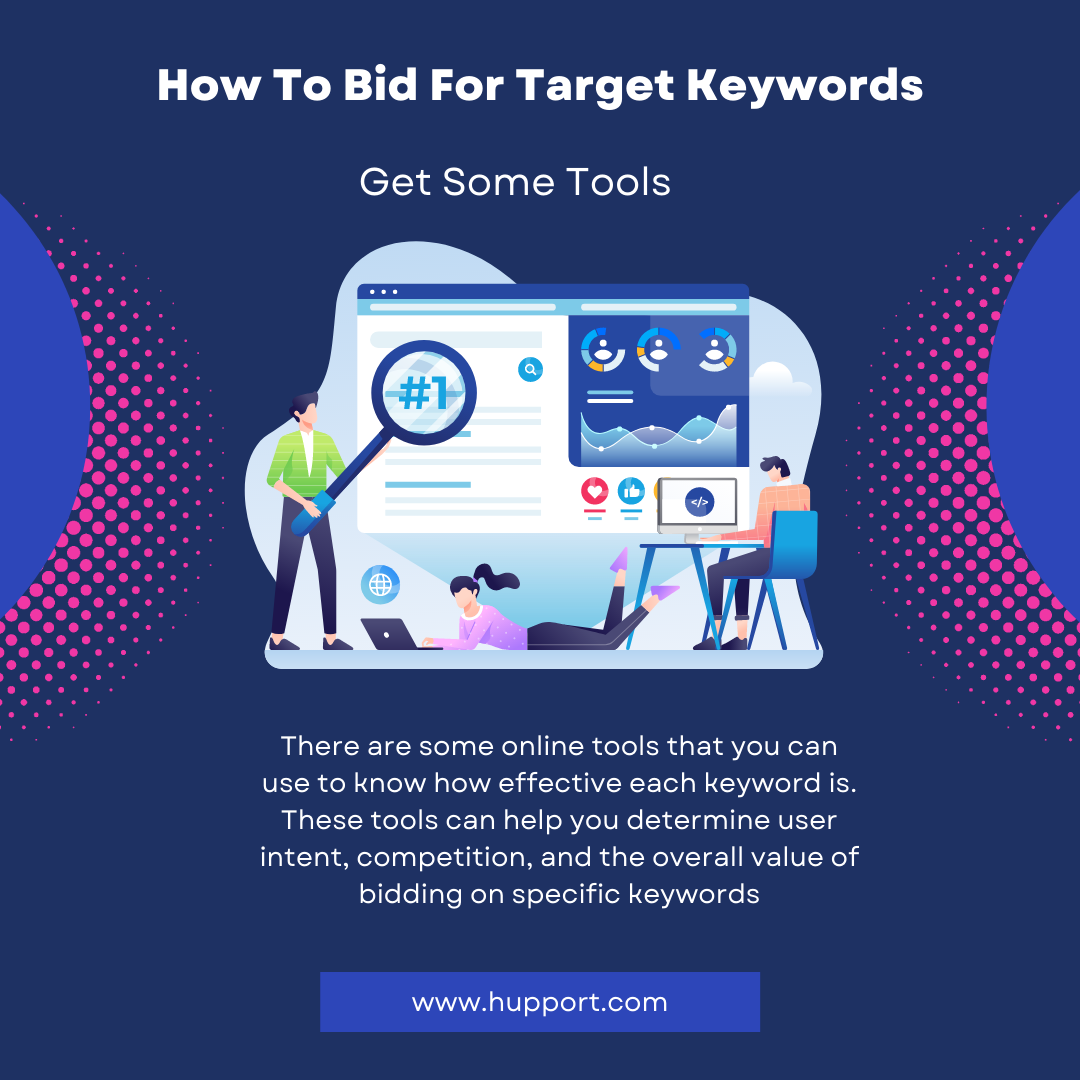
Get Some Tools
There are some online tools that you can use to know how effective each keyword is. These tools can help you determine user intent, competition, and the overall value of bidding on specific keywords.
Examples of such tools are Ubersuggest, Keyword Grader, Think With Google, etc. With these tools, you can get accurate information about specific keywords and their values before bidding.
Ten Converting Landing Pages For Dental PPC
Before looking at the 10 converting landing pages for dental PPC, let’s first take a quick look at what a landing page actually is for those that may not know what it is.
A landing page is any web page that a consumer can land on when they click on a link or ad. A landing page is usually a standalone page that is distinct from your homepage or any other page and usually serves a single and focused purpose.
On your landing page, you can make a trade, provide some sort of special offer, provide special information or a deal, and in return, visitors should provide their contact information. Your landing page is essentially the next step towards a visitor becoming an active client.
A well-designed, professional landing page can improve your conversion rates.
Here are a few fundamental practices of high-converting landing pages:
- Use a clear and concise value statement so that visitors can immediately understand the purpose of your page.
- Match your primary headline to the ad your visitor clicked to land on the page.
- Include testimonials and proof to back up your claims.
- Focus the whole page on a single offer, and with just one primary action expected from visitors.
- Use a conversion-centered layout to make your call-to-action (CTA) stand out to drive visitors’ attention.
- A/B testing. This involves testing each and every area of your landing page to see what performs best.
Below are examples of ten converting landing pages for dental PPC.






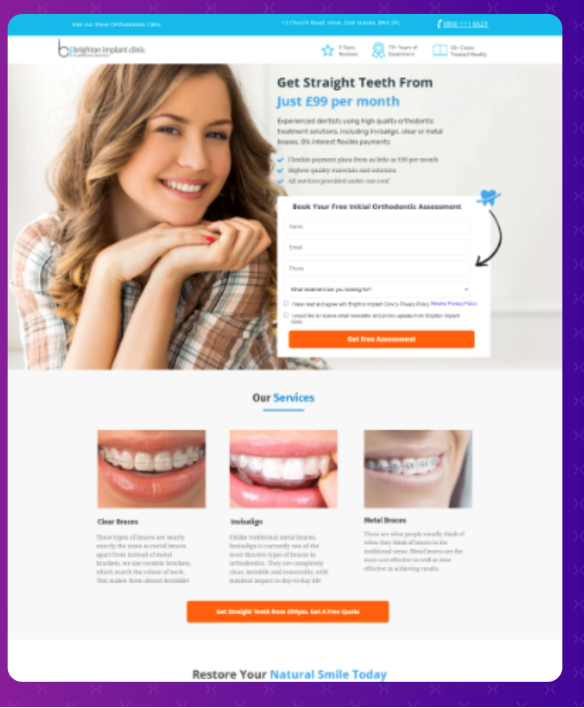
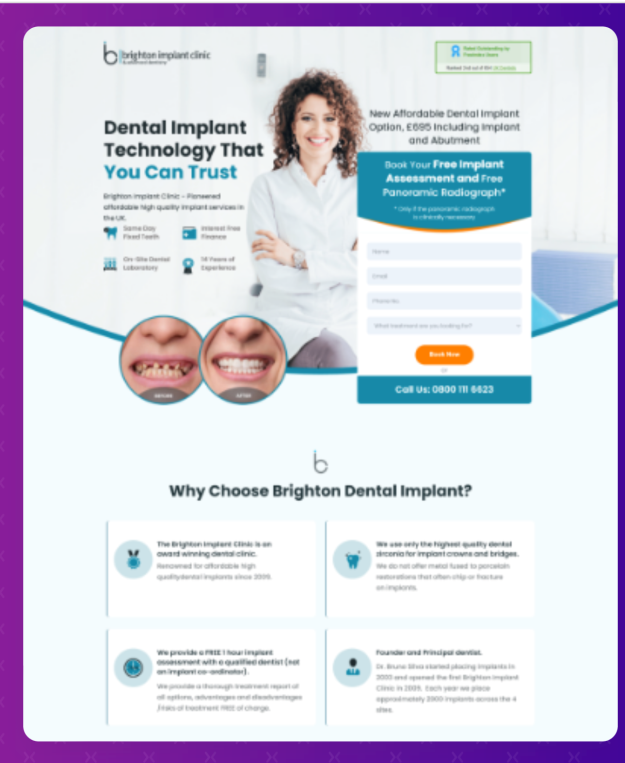

Facebook PPC: How It Works

Facebook PPC: How It Works
Facebook is one of the largest (if not the largest) social media platforms in the world. As of the third quarter of 2021, Facebook has roughly 2.91 billion monthly active users.
Facebook started as a social media platform, but it is now used by tons of companies and businesses all over the world as a marketing medium.
As a dentist, you can run a Facebook PPC ad campaign to convert and acquire lots of clients.
Facebook ads come in several varieties. You can promote your Page, post on your Page, share links to your website, and more. Facebook can be an instrumental tool to drive huge traffic to your website.
Facebook ads are targeted to users based on their location, demographic, profile information, what they liked, pages they visit, and links they click on.
After creating an ad, set a budget and bid for each click or impression that your ad will receive.
After you have created your ad, Facebook will provide a suggested bid range. As a starter, it is best to set your bid near the low end of this range.
Your click-through rate (CTR) will dictate the price you’ll need to pay for each click. CTR is the ratio showing how often people who see your ad end up clicking it.
If your CTR is high, your suggested bids will decrease and if your CTR is low, your suggested bid will increase. To increase your CTR and reduce the cost for each click, you should optimize your ads and targets.
After bidding, users will then start to see your ads in the sidebar on their Facebook pages or in their newsfeed.
In addition, your bid will also determine how much of your target audience you will be able to reach.
Facebook provides a great chart for every campaign that shows the size of your target audience and the size of your target audience that you’ve reached.
Your ad can reach more of your target audience when you increase your bid. For example, if your ad is performing well but you’re reaching less than 75% of your target audience, you can increase your bid to reach more of your target audience and get more clicks.
How To Setup Facebook Ads
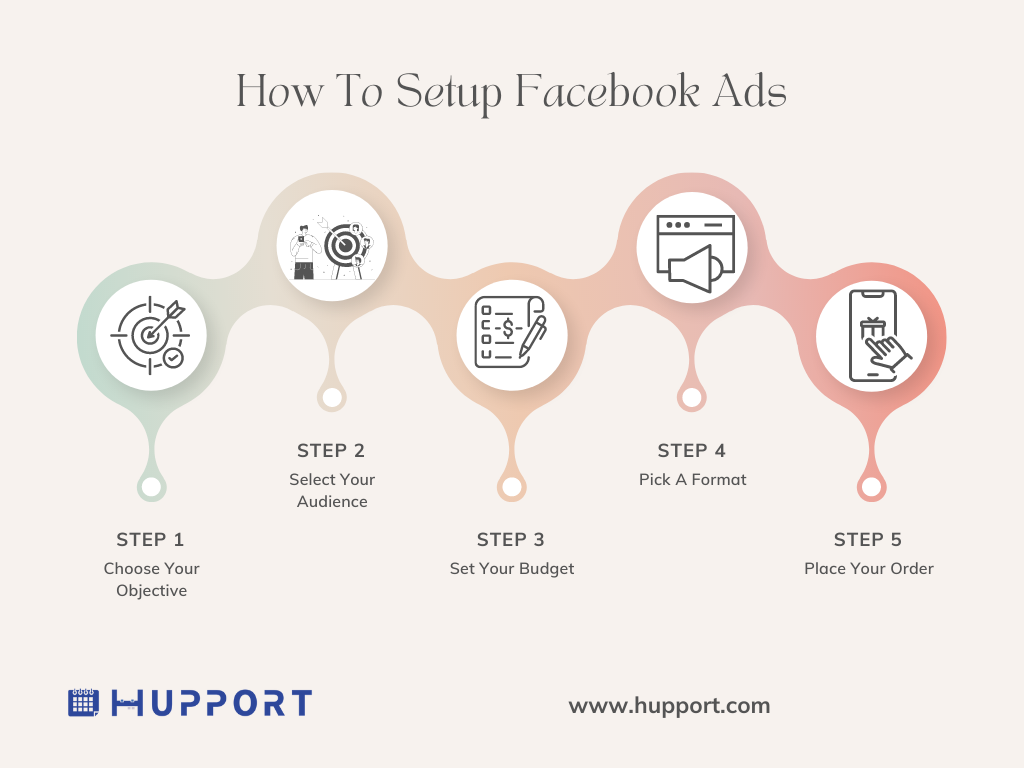
How To Setup Facebook Ads
Below are the steps to set up your Facebook ad:
Step 1: Choose Your Objective
Facebook ads work best when you focus on what you want to achieve. Objectives help to clarify your goals for your ad campaigns.
To choose the right objective for your ad, there are some questions that you need to ask yourself and provide answers to. Your object will determine the outcome of your ad.
Step 2: Select Your Audience
Who are your target audience? You will need to learn and know more about your target audience.
Define your target audience based on criteria such as age, gender, location, interests, demographics, behaviors, connections, and more.
Step 3: Set Your Budget
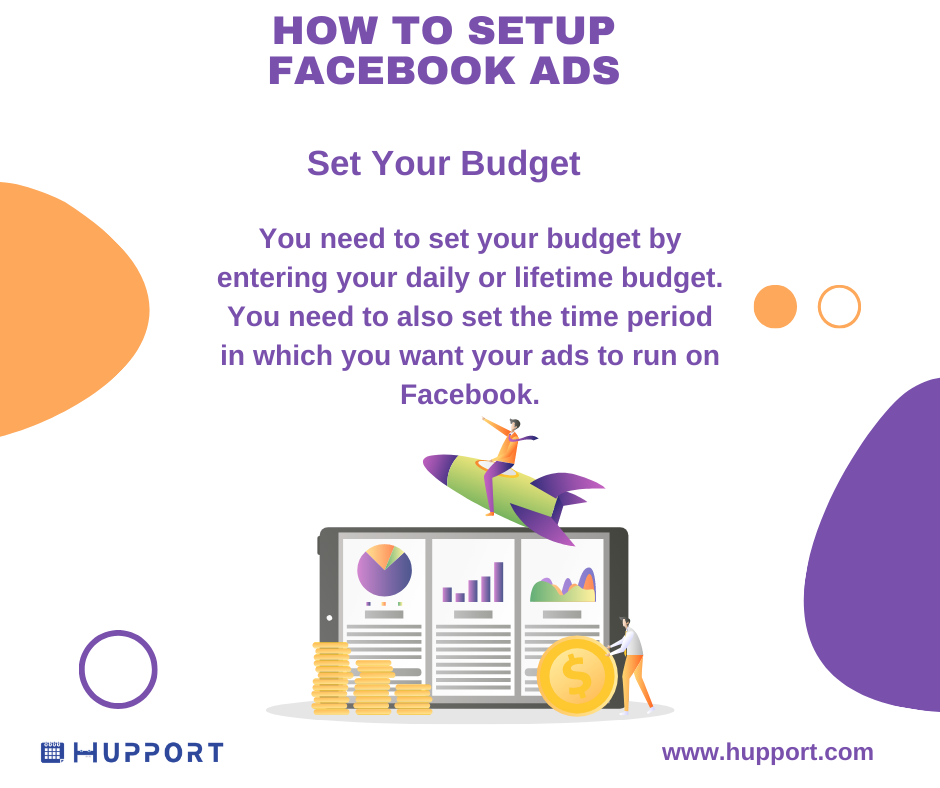
Set Your Budget
You need to set your budget by entering your daily or lifetime budget. You need to also set the time period in which you want your ads to run on Facebook. Your budget will determine your reach, the length of time your ad will run on Facebook and the frequency with which your ad will be displayed.
Step 4: Pick A Format
You will need to pick from the different formats available. You can choose to show a single image, single video, or slideshow in your ad. Choose the one that best works for you.
Step 5: Place Your Order
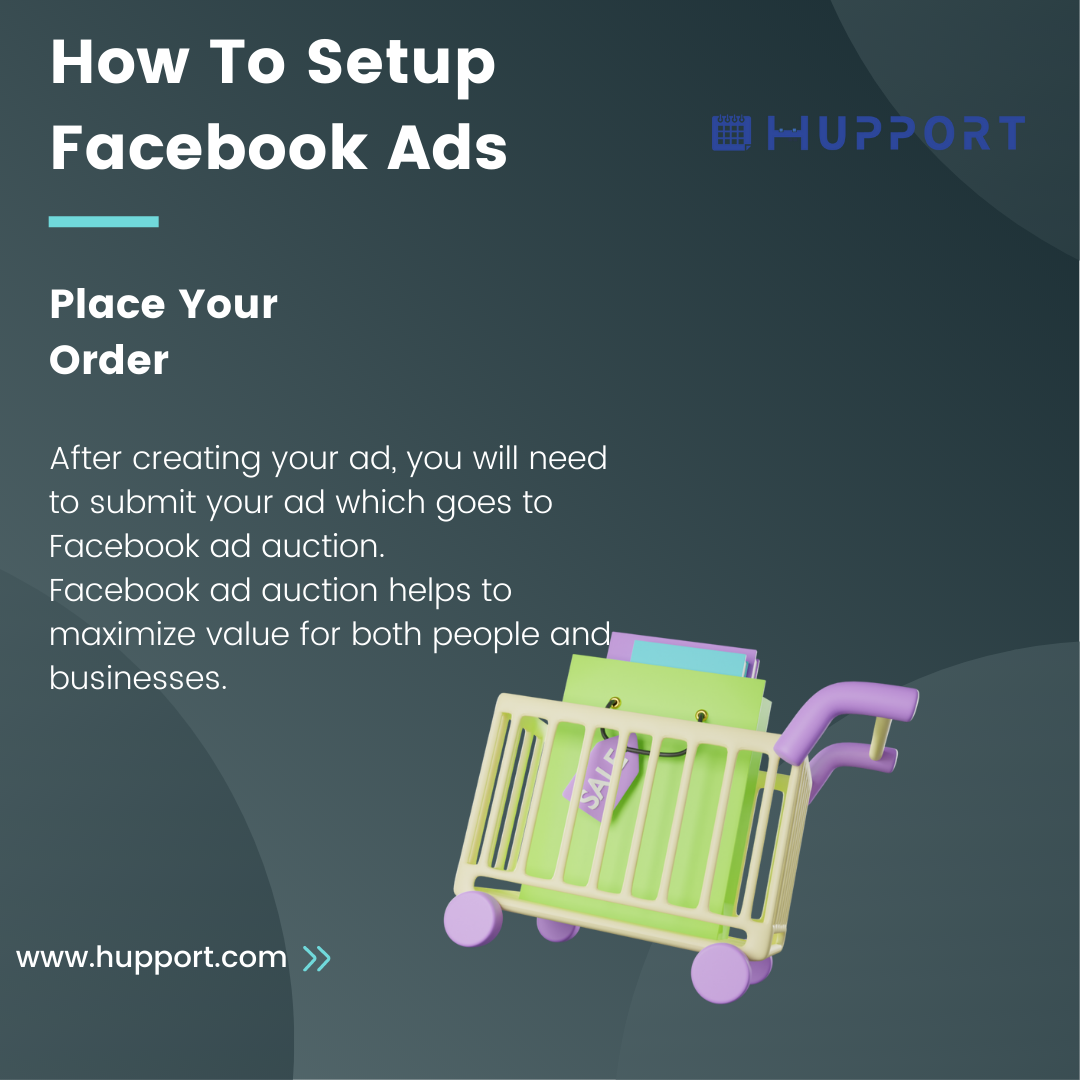
Place Your Order
After creating your ad, you will need to submit your ad which goes to Facebook ad auction. Facebook ad auction is used to determine the best ad to show to a person at a given point in time. Facebook ad auction helps to maximize value for both people and businesses. Understanding the ad auction can help you understand the performance of your ad.
Step 6: Measure And Manage Your Ad
When your ad is running, you can track the performance of your ad. You can view and edit your ad campaign in Ads Manager. You can see if your ad is delivering good outcomes or not, and make adjustments as needed.
Google AdWords vs Facebook Ads for Dentists
Many businesses and service providers are leveraging the strengths of advertising on Google and Facebook Ads to achieve maximum visibility, increase leads, find new customers, and ultimately increase sales and revenue.
Google AdWords and Facebook Ads are great advertising media. We’ll examine what sets Google AdWords and Facebook Ads apart, and why you should leverage them to increase your visibility, convert more clients, and increase revenue.
What Are The Differences Between Google AdWords and Facebook Ads?
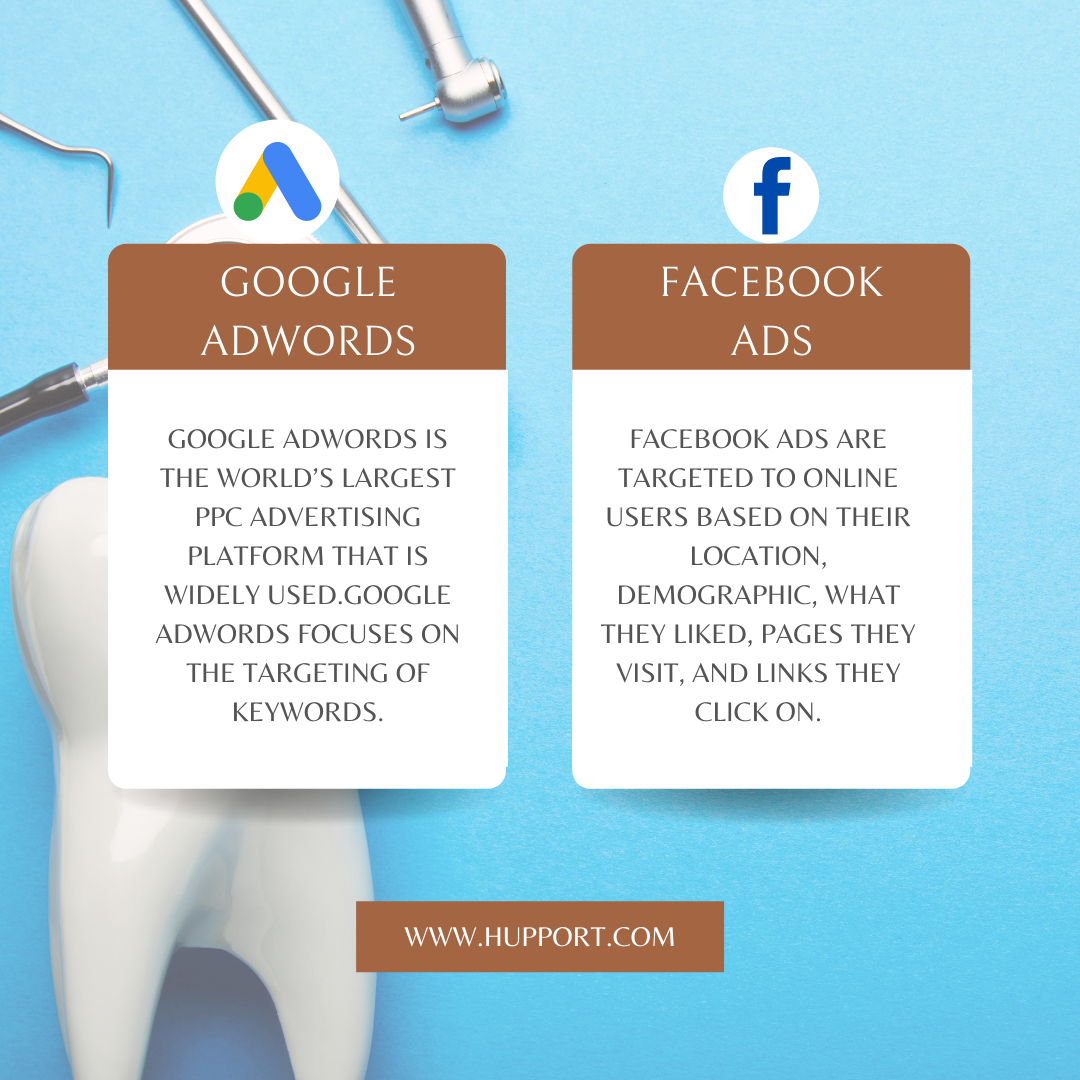
Differences Between Google AdWords and Facebook Ads
Google AdWords is the world’s largest PPC advertising platform that is widely used. Google AdWords focuses on the targeting of keywords. Businesses or advertisers using Google AdWords bid on keywords. When people search for products or services on Google using specific keywords or terms, the keywords or terms will determine the products or services that show up in search results.
Facebook Ads are targeted to online users based on their location, demographic, what they liked, pages they visit, and links they click on.
Unlike Google AdWords, which helps businesses find new customers via keywords, Facebook Ads helps consumers find businesses based on their online behavior and things they’re interested in.
How Much To Spend Per Month For Google PPC For Dentists Clinic?
How much you will spend on Google Ads varies widely depending on various factors such as the size of your target audience, search volume, sales goals, and the competitiveness of your industry. You can spend as little as $50 per month or as much as $10,000 or even more.
How To Hire A Marketing Agency Or Individual For Your Dental PPC
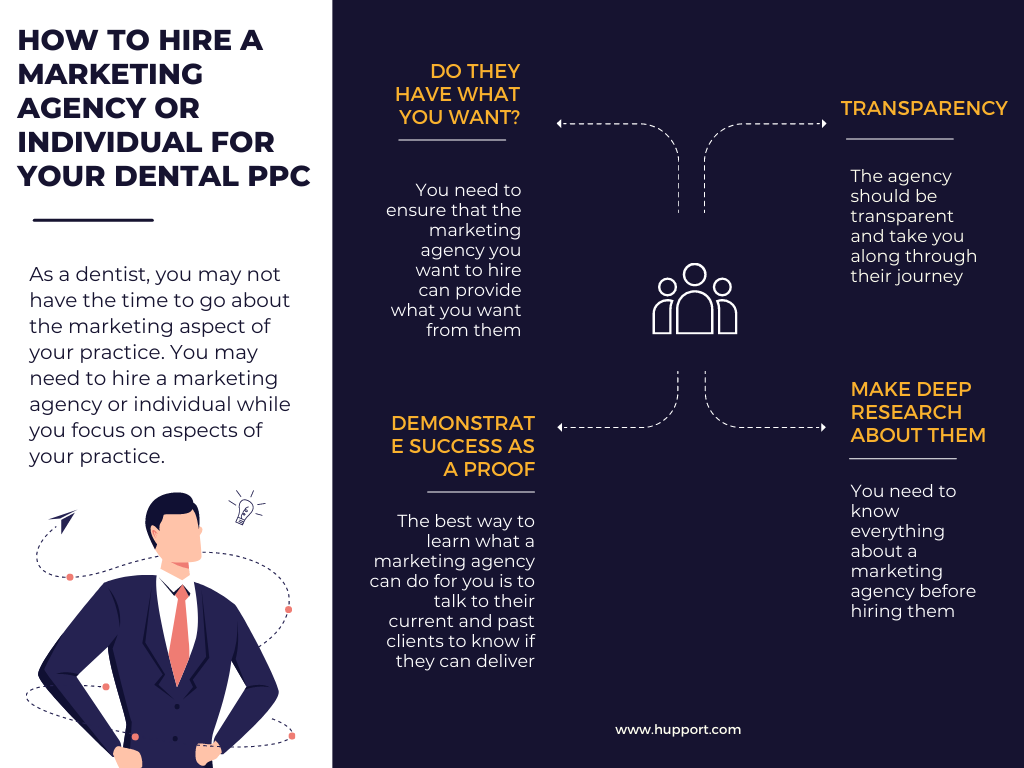
How To Hire A Marketing Agency
As a dentist, you may not have the time to go about the marketing aspect of your practice. You may need to hire a marketing agency or individual while you focus on aspects of your practice.
There are some vital criteria that you need to consider before hiring a marketing agency.
1. Do They Have What You Want?

Do They Have What You Want?
You need to ensure that the marketing agency you want to hire can provide what you want from them. They should be able to provide valuable content and help you achieve your goals.
2. Transparency
The agency should be transparent and take you along through their journey. A good marketing agency will consider your engagement as a partnership. They ensure that you’re informed of whatever is going on.
3. Demonstrate Success As A Proof
The best way to learn what a marketing agency can do for you is to talk to their current and past clients to know if they can deliver. You can also check through their portfolio, ask questions and let them prove their worth.
4. Evaluate Their Approach To Strategy Implementation
Beyond the reports, plans, and data that they may present to you, you need to know how they will help you understand and execute your marketing needs.
5. Make Deep Research About Them

Make Deep Research About Them
You need to know everything about a marketing agency before hiring them. Check them on their official website, check through review sites, social media pages, and other areas that you can find them online. Make deep research about them to have extensive knowledge about them. Also, consider their cost to know if your budget is large enough to hire them.
Cost For Hiring A Marketing Agency For PPC
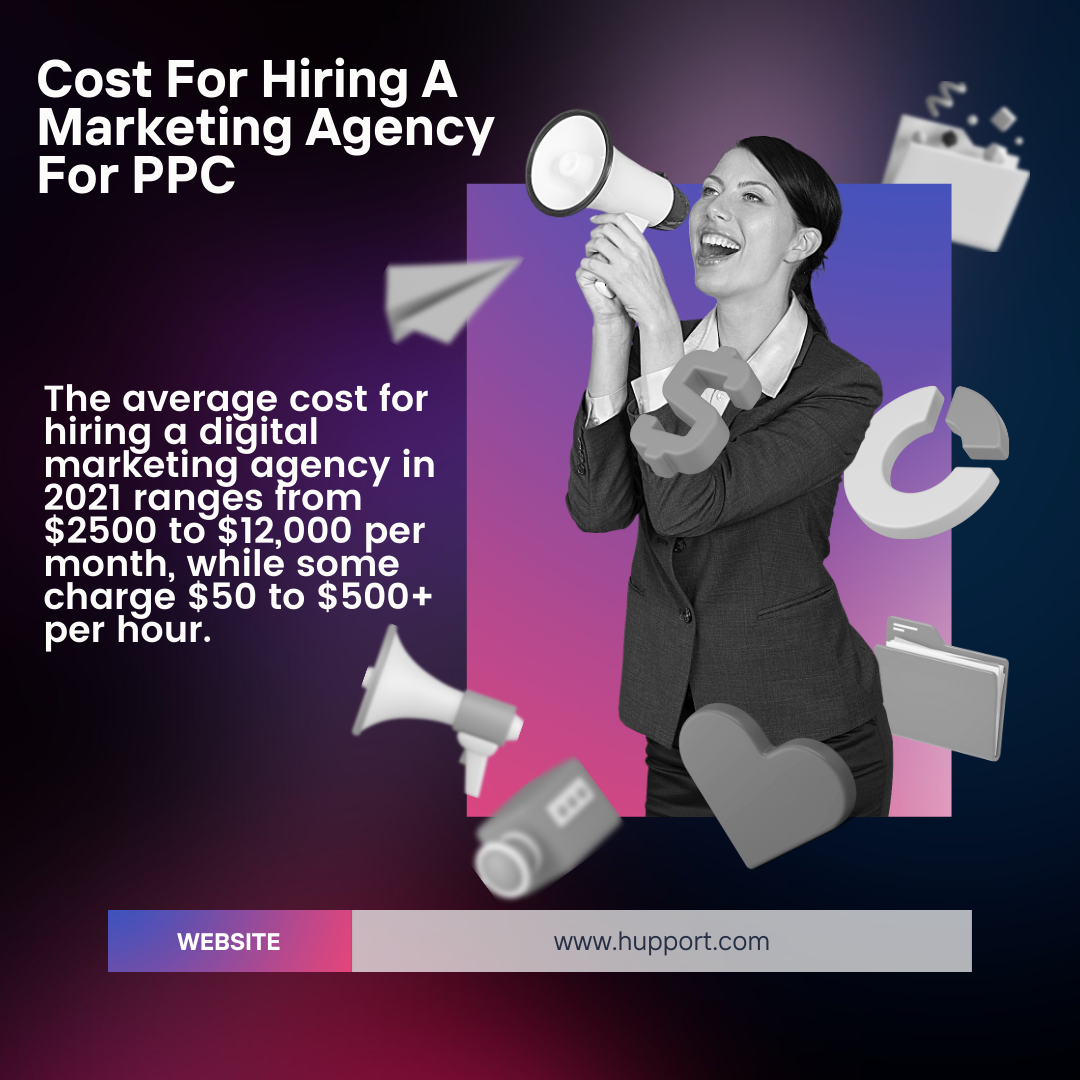
Cost For Hiring A Marketing Agency For PPC
The cost of hiring a marketing agency varies depending on different factors. While some marketing agencies charge lower, some others may charge higher depending on reputation and location. Your marketing goals and duration of services also determine the cost.
The average cost for hiring a digital marketing agency in 2021 ranges from $2500 to $12,000 per month, while some charge $50 to $500+ per hour.

